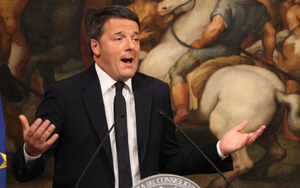Miraviglia scandal
| Etruria | |
| Started | 3 April 2016 |
|---|---|
| Judges | Carmine della Chiesa Giorgio Urbano Cassini Pierligui Versace |
The Miraviglia scandal (Vespasian: Scandalo miraviglia) was a political corruption scandal and judicial investigation that took place in Etruria from 2016 to 2018, resulting directly in the collapse of the Etrurian Federalist Party-led coalition government and indirectly, the rejection of EC membership in the 2016 referendum and the victory of the far-right Tribune Movement in the August 2016 federal election. The investigation led to the arrests of hundreds of politicians, civil servants and judiciary officers, including former President Emiliano Reali, former Deputy President Andrea Salvini.
The investigation discovered the Reali government (2011-2016) had used bribes to secure the agreeing opinion of four Constitutional Court judges over the government's introduction of Eminent domain powers which were used to purchase land for development or construction projects that did not actually exist, these were funded by federal government contracts. The money awarded for these fake projects was distributed through a series of front companies owned by EFP donors and then transferred to politicians, civil servants and others involved in the scheme. According to the investigation close to €650 million (₣2.94 billion in 2022) of tax-payers money was lost to the scheme.
The scandal has been described as one of the "most seismic events" in modern Etrurian history and one of the most consequential owing to its direct and indirect results and effects on Etrurian politics, culture and society. Some analysts claim the scandal had decimated the Etrurian "love affair" with Sotirian democracy and mainstream parties in general, while it is universal accepted among commentators that the scandal provided the fertile environment and atmosphere for the election of the first far-right government since the Solarian War.
Name
The term Miraviglia directly translates into Vespasian as wonder, astonishment, amazement, surprise and was drawn exclusively from one of the fake projects, dubbed "Piazza Miraviglia" (lit. Wonder Place), a supposed federally funded theme park in the state of Carvagna. The term was introduced during the earliest days of the scandal by the Telegrafo Solariano, which wrote in an editorial, "of all the fake projects produced to steal money from the people, Piazza Miraviglia is truly the most apt, for are not we all in utter wonder of their criminality and gangsterism?"
Arrest of Gherado Vitelli
Miraviglia began on 3 April 2016 when Gherado Vitelli, a freelance journalist was arrested for trespassing on federal property, which would later be revealed the site of a fake wind farm project. During his interview with the Veratian Police Service he revealed that he had spent the past two years investigation a scheme involving false infrastructure projects used to launder money for politicians, lobbyists, civil servants and business people. In exchange for being let-off with a caution, he passed all of his evidence to the Public Prosecutor Office's of Veratia. Vitelli was also prohibited by the PPO from releasing his evidence or sharing his knowledge with the media.
Investigation
Augustp Carafa, the Public Prosecutor-General of Veratia directed Judge Carmine della Chiesa to investigate Vitelli's claims, Carafa directed total secrecy around the investigation for fearing political pressure or interference. As a result, the early stages of the investigation were conducted in spare office space in Della Chiesa's counselling business. Carafa was assisted by fellow magistrates Maria Sophia Bellanova and Stefano Paolo Augustino. The investigation focused on the land Vitelli had been arrested for trespassing onto, the team were quick to trace the project's corresponding business records. On the 12 April, the team reported to Carafa that the wind farm was being constructed by a company that had no records beyond its name, address and managing director's name, "Marco Zara", whom was soon found to be an alias.
The land on which the wind farm was to be constructed however, was not seized by the federal government via eminent domain like all others, but was sold legitimately by a farmer to a man identified as Carlo Solariano, a prominent businessman and donor to the Etrurian Federalist Party. On the 16 April, Solariano was arrested for fraud, news of his arrest went national and the next day the EFP distanced itself from Solariano, describing him as a "losca" (literally shady). Disgruntled by the lack of support and loyalty, Solariano opted to divulge more evidence to the Veratian prosecutors, detailing that the wind farm was actually one of "hundreds" of similar fake projects across Etruria. This prompted Carafa to authorise a widening of the investigation, he also began to coordinate with other Prosecutor-Generals in Palestrina, Torrazza and Carvagna, states that had been listed by Solariano.
First phase
Second phase
Political fallout

